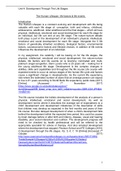Unit 4: Development Through The Life Stages
The Human Lifespan, life factors & life events
Introduction
The Human Lifespan is a constant evolving and development with life being
valuable with each life stage of: conception, birth and infancy, childhood,
adolescence, adulthood, older adulthood and the final stages – which all have
physical, intellectual, emotional and social development for each life stage for
an individual, but life can end at any life stage. The nature-nurture debate
both plays a part in the development of an individual’s physical, intellectual,
emotional and social development for each life stage. Alongside the 5 life
factors of genetically inherited conditions, biological factors, environmental
factors, socioeconomic factors and lifestyle choices. In addition of life events
influences the development of an individual.
In my assignment, the celebrity I will be basing on for the life stages, the
physical, intellectual, emotional and social development, the nature-nurture
debate, life factors and life events on is Grammy nominated and multi-
platinum singer-songwriter, Demi Lovato who is 25 years old – making her in
the young adulthood life stage. Development is the complex changes in
abilities, skills and capabilities and throughout the life course Life course with
expected events to occur at various stages of the human life cycle and factors
cause a significant change in developments. As the current life expectancy
rate where the estimated number of years that an average person can expect
to live is 81 years according to World Bank life expectancy public data (2017)
[Online] [Accessed 7th November 2017)
https://www.google.co.uk/publicdata/explore?
ds=d5bncppjof8f9_&met_y=sp_dyn_le00_in&idim=country:GBR:USA:JPN&hl
=en&dl=en.
The life course includes the holistic development of the analysis of a person’s
physical, intellectual, emotional and social development. As well as
development norms where it describes the average set of expectations to a
child’ development and development milestones of the description of skills
that children may develop as expected in the first months and years of their
life course. But also delayed development of when a child’s development falls
behind the development within the expected time period, this could be causes
by brain damage before or after birth and infancy, disease, visual and hearing
disability, poor social interaction and nutrition. The development progress will
need to be checked by health professional and will be referred to the
appropriate specialist for advice or therapy. And also arrested development
where the development has stopped. Pearson School and FE Colleges (2010)
4 Development through the life stages. Pp. 5, 6, 7, 16 [Online] [Accessed 7th
October 2017)
http://www.pearsonschoolsandfecolleges.co.uk/AssetsLibrary/SECTORS/
Trade/Sample%20pages%20(for%20Ed%20Supplier%20sites)/
Newsamplecontentfor2010/BTECNationalHealthandSocialCare-
SampleStudentBookMaterial.pdf
1
, Unit 4: Development Through The Life Stages
P1 – Describe (Give a clear, straightforward description which includes
all of the main points) physical, intellectual, emotional and social
development for each of the life stages of an individual
Contraception and pregnancy
The human life begins with
conception. When a woman is
fertile once a month and
produces an egg cell, the
physical development of when
the egg cells travel from the
ovary along the fallopian tube
towards the uterus when
sexual intercourse takes place-
making ovulation occur. Then
one sperm out of the million
may fertilised the egg to fuse
and create a new being/s.
Fertilisation causes the genetic
materials in the sperm to join with the genetic materials of the egg to start a
new life which begins during conception.
Pregnancy being a 9 months process “an embryo develops into a baby as the
first month - where the baby is still an embryo and it’s organs and body parts
develop, second month - the baby will start to move around and fingers
develop and be slightly webbed, fourth month – their bones begin to form, six
month – the baby begins to put on weight, skin becomes smooth and less
wrinkly, seventh month – the baby can open and close their fully developed
eyes, eighth month – lungs develop and the ninth month the baby is fully
developed and ready to come out the womb in labour” Chloe Houselander.
(2013) P1 Development through the life stages. Prezi. [Online] [Accessed 18
October 2017] https://prezi.com/9id5hlvil0ry/p1-development-through-the-life-
stages/
Birth & Infancy (0-3 years)
Physical
Babies physical development include eye
coordination, as they are quickly able to focus
their eyes on colours and moving sounds. They
will also develop muscle strength in their fine
motor skills and gross motor skills as babies
have very little coordination at the start but will
start to have their muscles develop in their
neck, so they can lift their heads and also
eventually grasp objects. “Newborns brains are
not fully developed but they are able to identify
different tastes and recognise scent of their
mother/guardian.” Chloe Houselander. (2013)
P1 Development through the life stages. Prezi.
[Online] [Accessed 4th November 2017] https://prezi.com/9id5hlvil0ry/p1-
2




